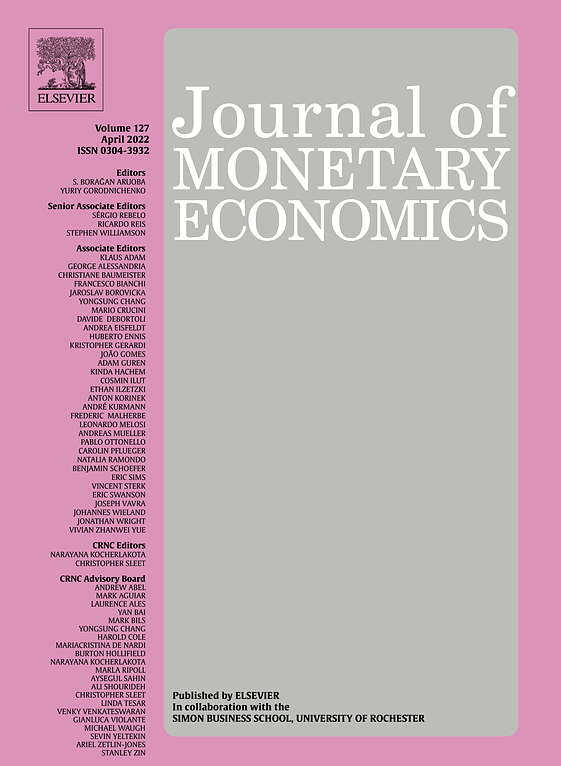Editorial Board
Distinguishing constraints on financial inclusion and their impact on GDP, TFP, and the distribution of income
The making of hawks and doves
International evidence on long-run money demand
An heterogeneous-agent New-Monetarist model with an application to unemployment
Finance and productivity growth: Firm-level evidence
Flowers of evil? Industrialization and long run development
Empirical evidence on the Euler equation for consumption in the US
Endogenous forecast switching near the zero lower bound
Managing self-organization of expectations through monetary policy: A macro experiment
The federal funds network and monetary policy transmission: Evidence from the 2007–2009 financial crisis
Recessions and recoveries: Multinational banks in the business cycle
On average establishment size across sectors and countries
Through scarcity to prosperity: Toward a theory of sustainable growth
Agnostic Structural Disturbances (ASDs): Detecting and reducing misspecification in empirical macroeconomic models
Does demand noise matter? Identification and implications
Financial shocks, firm credit and the Great Recession
The origins of aggregate fluctuations in a credit network economy
Unemployment crises
Learning, confidence, and business cycles
Default cycles
Learning, parameter drift, and the credibility revolution
Business complexity and risk management: Evidence from operational risk events in U.S. bank holding companies
Wealth creation, wealth dilution and demography
Exchange rates, local currency pricing and international tax policies
Foreign exchange reserves as a tool for capital account management
Does a big bazooka matter? Quantitative easing policies and exchange rates
News-driven inflation expectations and information rigidities
What drives heterogeneity in the marginal propensity to consume? Temporary shocks vs persistent characteristics
Banks’ exposure to interest rate risk and the transmission of monetary policy
The macroeconomic effects of social security contributions and benefits
Bank credit risk networks: Evidence from the Eurozone
Optimal Time-Consistent Monetary, Fiscal and Debt Maturity Policy
Aggregate expected investment growth and stock market returns
Low-frequency fiscal uncertainty
Intratemporal nonseparability between housing and nondurable consumption: Evidence from reinvestment in housing stock
Participation following sudden access
The Phillips multiplier
Learning and job search dynamics during the Great Recession
Do survey expectations of stock returns reflect risk adjustments?
Job Search under Debt: Aggregate Implications of Student Loans
Central bank communication that works: Lessons from lab experiments
Worker churn in the cross section and over time: New evidence from Germany
Structural scenario analysis with SVARs
Delphic and odyssean monetary policy shocks: Evidence from the euro area
From secular stagnation to robocalypse? Implications of demographic and technological changes
A quantitative theory of time-consistent unemployment insurance
Output hysteresis and optimal monetary policy
Central bank reputation, cheap talk and transparency as substitutes for commitment: Experimental evidence
A model of state-dependent monetary policy
The short-term effects of tax changes: The role of state dependence
Inefficiently low screening with Walrasian markets
More unequal income but less progressive taxation
History remembered: Optimal sovereign default on domestic and external debt
Taking off into the wind: Unemployment risk and state-Dependent government spending multipliers
Information disclosure and the choice between arm’s-length and inside debt
State-dependent fiscal multipliers with preferences over safe assets
Optimal capital account liberalization in China
Taxation, expenditures and the Irish miracle
Input-output linkages in Pigouvian industrial fluctuations
Effectiveness and addictiveness of quantitative easing

